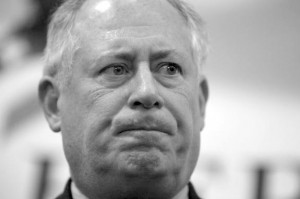Is This Any Way to Run a City’s Schools?
Leaked CTU Proposals Won’t Do Anything to Improve Schools’ Poor Performance

Compulsory-Unionism Stronghold State Drowning in Taxes and Debt
(source: National Right to Work Committee February 2012 Newsletter)
In early 2012, as the national economy continues struggling to recover from the severe 2008-2009 national recession, many states are in financial dire straits. But Big Labor-dominated Illinois is very arguably the worst fiscal basket case of all.
Early last month, Moody’s Investors Service downgraded Illinois debt to A2, finding its creditworthiness to be the worst of any of the 50 states, including even government union-controlled California. In its report, Moody’s specifically berated Illinois’s “weak management practices.”
On January 22, a Chicago Tribune editorial observed: “Deadbeat Illinois owes some $8.5 billion in old bills, tax refunds, employee health insurance and interfund borrowing debts. That’s roughly one-fourth the state’s spending this year from its general funds.” Over and above that, Illinois has “nearly $200 billion in debts and unfunded obligations.”
Burdened by labor policies authorizing union monopoly bargaining and forced union dues and fees in both the private and public sectors and a tax and regulatory climate that are hostile to private-sector job and income growth, the Prairie State has been in trouble for a long time.
Big Labor ‘Cure-All’ For Rapidly Rising Government Debt: Massive Tax Hikes
But Illinois’s outlook grew even bleaker after union-label Democratic Gov. Pat Quinn and like-minded legislators acted in January 2011 to put the state, in the governor’s words, “back on sound fiscal footing.”
Having been narrowly reelected in November 2010 with the help of millions of forced-dues dollars pumped into his campaign by the union political machine, Mr. Quinn quickly won legislative approval of a package of tax hikes designed to extract an additional $7.5 billion a year from hardworking Illinoisans.
Among the tax increases enacted with Big Labor’s enthusiastic support were a whopping 67% increase in the marginal tax rate for households and a huge 46% increase in the rate for incorporated businesses.
State Senate President John Cullerton (D-Chicago) and House Majority Leader Barbara Flynn Currie (D-Chicago), both union-boss lackeys, insisted the purpose of the massive tax hikes was to “pay off our old debt” and “deal with the structural deficit.”
In reality, Illinois has sunk even deeper into its fiscal morass over the last year.
But the tax hikes have enabled government union bosses to perpetuate throughout Illinois’s public sector, at the average citizen’s expense, outrageous featherbedding and counterproductive work rules.
Union lobbyists have also kept in place, with only cosmetic changes, a perverse public pension system encouraging healthy employees in their mid-fifties to retire with full benefits.
‘Why Is Scott Walker, Rather Than Pat Quinn, Facing a Recall Vote?’
Increasingly Greece-like Illinois presents a telling contrast to its northern neighbor Wisconsin, where GOP Gov. Scott Walker pushed through, over union chiefs’ noisy protests, legislation rolling back forced union dues and monopoly bargaining in the public sector while Mr. Quinn was hiking taxes.
Over the past year, Mr. Walker’s reform package has, according to Moody’s, brought Wisconsin’s finances “closer to a structural budgetary balance.” Mr. Walker and his allies also balanced this year’s budget, without approving any new taxes.
“Wisconsin shows how a state can get government spending back under control and create a better climate for private-sector growth by curtailing public-sector union bosses’ special privileges,” said National Right to Work Committee Vice President Matthew Leen.
“Meanwhile, Illinois shows just how deadly the combination of higher taxes and unrestrained monopolistic government unionism can be to a state economy.
“Why is Scott Walker, rather than Pat Quinn, facing a recall vote this year? The obvious answer is, the union bigwigs who are financing the Wisconsin recall drive are motivated solely by crass self-interest, and care nothing about the good of the state.”

Leaked CTU Proposals Won’t Do Anything to Improve Schools’ Poor Performance

Wherever Big Labor wields the power to collect forced union dues, union bosses funnel a large share of the confiscated money into efforts to elect and reelect business-bashing politicians. Employment growth tends to lag as a consequence.

Members Insist They Keep Pro-Right to Work Campaign Promises